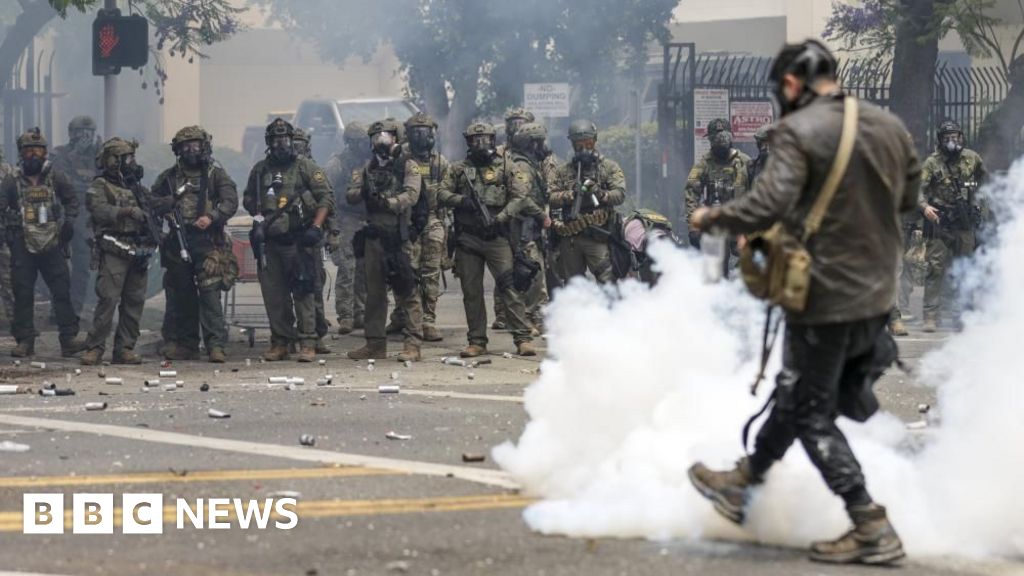ARTICLE AD BOX
By Yogita Limaye & Aakriti Thapar
BBC News
image sourceReuters
image captionWomen are taking to the streets to demand their rights"We want equal rights, we want women in government," dozens of female protesters chanted as they marched down a street in Kabul on Wednesday.
A day earlier, the Taliban had announced their interim cabinet of ministers. There are no women in it, and they've also abolished the women's affairs ministry.
"We cannot accept this, and that's why we came out," Sara (name changed) told the BBC. It was the second demonstration she was participating in over the past week.
"We were marching peacefully. Then I saw 4-5 vehicles with about 10 Taliban fighters in each of them, following us," said Jia (name changed), another protester.
The women say they were stopped, lashed with whips, and beaten with batons that emit electric shocks.
"They struck my shoulder twice. I could feel pain all over my body. It still hurts and I can't move my arm," Jia said. "They also used a lot of bad words and abused us. It's too shameful for me to repeat the names they called us."
"We were all beaten. I was also hit. They told us to go home saying that's where a woman's place is," said Sara. Her phone was knocked out of her hand by a Taliban fighter when she tried to film them stopping the protest.
The Taliban have said they're committed to women's rights, and are not against women being educated or having jobs.
But since they seized control on 15 August, they have asked all women, except those in the public health sector, to stay away from work, until the security situation improves.
Security was one of the reasons the group gave when they were in power in the 1990s to prevent women from working, and many like Sara fear this time will be no different.
She used to work as an adviser in a government department, and also ran her own business. She says her family fears for her life.
"They tell me not to go for protests. They [the Taliban] will kill you. I fought with my brother to attend the march on Wednesday. It's important that we raise our voice. I'm not scared. I will keep going again and again and again, until they kill us. It is better to die once than die gradually."
Jia is married and has four children, including a newborn baby. She says her family encourages her to protest. "The Taliban aren't here for a few days. They're here for the long run. We need to demand our rights, not just for us, but for our next generation, our children," she said. "We know the Taliban will find us and might target us. But we don't have a choice. We have to continue."
During protests in Herat earlier this week, three people were killed. The Taliban were firing guns in the air to disperse crowds. There are many videos of the group's fighters lashing protesters with whips.
image sourceReuters
image captionWomen say they are being beaten while protestingReporters covering demonstrations have also been attacked. And in the past few days the Taliban appear to have got more brutal.
Etilaatroz, an Afghan news organisation which publishes a daily newspaper, said five of its journalists had been detained on Wednesday. Two of them were beaten so badly with cables, they needed to be treated in hospital.
اطلاعات روز: تقی دریابی و نعمتالله نقدی، دو گزارشگر روزنامه اطلاعات روز پس از بازداشت توسط طالبان، به شدت مورد لتوکوب قرار گرفتهاند.
آثاری از شلاق و کیبل بر سر، صورت و بدن این دو گزارشگر اطلاعات روز به چشم میخورد. pic.twitter.com/0vuEwYW28b
The BBC is not responsible for the content of external sites.View original tweet on Twitter
Anelise Borges, a correspondent for Euronews, told the BBC that her Afghan colleague had been detained by the Taliban for more than three hours on Wednesday, when they went to ask them for permission to film a protest.
"He was slapped in the face multiple times. He's stunned by it. His phone and wallet were confiscated," she said.
The BBC also spoke to an Afghan journalist who was detained while filming a protest in Kabul on Tuesday.
"They detained many protesters and journalists. They took my phone, mic and other equipment. They hit me repeatedly, with their hands, and books. I told them I was a journalist but they wouldn't listen. I saw them beating others with guns. They deleted all my videos," he said. "The display photo on my phone was of a man and woman embracing each other. This really angered a Taliban commander who struck me hard across my face."
Taking note of the attacks on protesters and journalists, the United Nations Assistance Mission in Afghanistan said "de facto authorities have obligations to safeguard the rights of all Afghans without violence."
The Taliban have responded by effectively banning protests. They've said demonstrators must get permission from the Ministry of Justice, and then security services must be given information about the location and time of the protest, and even the banners and slogans that will be used.
For Jia and Sara, demanding their rights has become even harder.

 3 years ago
86
3 years ago
86








 English (US) ·
English (US) ·